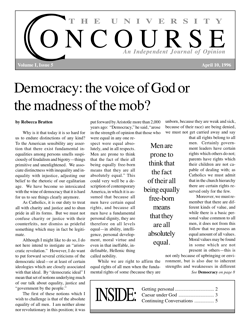Thomism and intellectual freedom
by Kathleen van Schaijik
Mr. Morel de la Prada graciously invites us “to prefer what the Church prefers” in our philosophizing—that is, Thomism. He and others seem troubled by the continued resistance to this invitation. Why will we not accept it with joy? He has not proposed that we cease studying everyone else; he has not proposed that we treat St. Thomas’ every word as infallible; he does not propose a closed system for our uncritcal acceptance. He simply asks us to acknowledge (and submit ourselves to) the unambiguous recommendation of the Church with respect to philosophy. Why would any loyal Catholic decline such an uncontroversial invitation?
Allow me to explain. The invitation is not so uncontroversial as it may at first appear. When Mr. de la Prada (or anyone else) amasses Magisterial quotations and urges us to “prefer what the Church prefers,” intended or not, here is what comes across: “Every individual Catholic thinker, student and faculty has a religious duty to be Thomistic in his or their philosophy.” And by this is usually meant not only that we ought to immitate Thomas’ realism and universalism, but also that we should adopt his philosophical framework; that we should hold, for instance, that being and good are convertible, that evil is a privation, and that all men necessarily will the good.
But, (as Richard Gordon so ably showed in his March 12 article) this is just what the Church does not say, and would not say, because of her profound respect for the integrity and legitimate automony of philosophy. Or, if she has said it (in the person of individual popes) she has violated her own divinely-ordained boundaries, and in so doing has threatened not only the intellectual life of her sons, but (consequently) her own well-being. It follows from this that philosophers who love her truly will resist her self-defeating tendency to encroach on their domain.
Consider an analogy in the political realm. During most of the nineteenth century, when republicanism was on the rise in Europe, the Church displayed a strong preference for monarchy. She had had a long and fruitful relationship with monarchy; it seemed much more conducive to faith than did republicanism, which (at least historically) went hand-in-hand with irreligion and rebellion. Many in the Church considered the new form of government to be essentially hostile to the Faith, and sought to have it condemned as a virtual heresy. With all the social upheaval and religious confusion prevailing at the time, it is easy to imagine what a temptation this must have been! And how frustrated and baffled many of the faithful must have felt when some who called themselves Catholics openly defended republicanism and resisted the reinstatement of the monarchies! You can picture how earnestly they might have urged all Catholics to simply “prefer what the Church prefers” in their politics. But what a catastrophy it would have been for both the world and the Church had not some of her members insisted on their right to their own political views, and pressed the Church to recognize that republicanism, too, might be a worthy ally in the world!
I do not at all mean to suggest with this analogy that St. Thomas’ thought is as obsolete and passe as are the European monarchies; nor do I argue that the time has come to replace him with Phenomenology. I only want to try to show that it is not always in the best interests of the Church to submit to her recommendations outside the area of Faith and morals. This seems to me to be partiucularly true in philosophical matters, where unles we are willing to think things through for ourselves—the intellectual life of the Church will suffer drastically in health and rigor.
The Church may point to Thomas as a proven and extraordinarily rich source of insight and understanding, and say we are sure to do well if we begin by studying him, but because she (as a whole) understands what philosophy is, she does not compel us to simply adopt his system (be it ever so open), because she knows that to do this would be profoundly unphilosophical, and thus antithetical to the authentic pursuit of truth.
I think what the Church (when she is most herself) really prefers, is that her philosophers and university students feel free to pursue whatever avenues of truth (given a few very broad boundaries) strike them as being most promising and fruitful, to delve into whatever great ideas resonate most with our own minds. Naturally, aware of the serious dangers involved in such an enterprise, she cautions us against the risks of striking out on our own, of blazing new trails in the realm of philosophy; she prudently reminds us that Thomas has been for centuries a safe and sound route to truth; but she does not say that we must avoid taking intellectual risks! On the contrary, every time she canonizes a martyr or rewards a hero, or exalts an original thinker, she repeats the maxim that no great end is achieved without great hazards.1
Catholics (as such) have a religious obligation to revere Thomas—as both a great master and a saint. Philosophers and university students (as such) have a vocational obligation to examine each of his claims and principles critically, just as he did with Augustine’s and Aristotle’s; to approve those they recognize as true; modify those they think faulty or incomplete; and reject those they find to be false. Unless they do this, they act in a way unworthy of their calling.
To interpret the Church’s preference for Thomas, then, as meaning that all Catholic philosophers ought to be Thomistic (in the main lines of their thought) would be not just a dogmatical exaggeration, but an intellectual disaster—a disaster which would ultimately undermine our Faith.
Kathleen van Schaijik, Class of ‘88
- See Newman’s Oxford University Sermon, XI: 23. ↑


